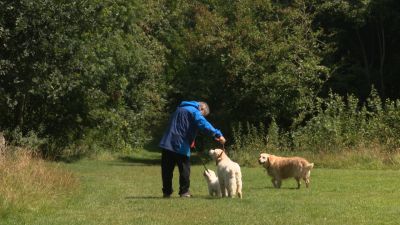Dog walking cap set to be introduced in North Devon

A dog walking cap could be coming into place in areas of Devon which would limit people to the number of dogs a person can walk at once.
The cap is part of a number of measures North Devon council is considering aimed at controlling dogs in public spaces.
A consultation on the plan found most residents were supportive of the proposals.
The council says capping the dog-to-person ratio at six-to-one, with no more than three off the lead at any time, will help manage the negative impact of the intensive walking of dogs.
However, dog walkers believe the plan could inadvertently lead to price increases and fewer people using their services.
The local authority is also planning to impose temporary restrictions banning dogs or keeping them on leads for two months in areas with a high level of dog-related anti-social behaviour or fouling.
This will be done through a legally enforceable Public Space Protection Order.
Around 60 per cent of the 855 responses received to a consultation were in favour of temporary restrictions at hotspots.
There was also general support for retaining current dog controls by both dog-owning respondents and those who don’t have dogs.
Proposed controls involve excluding dogs from children’s play areas, designated sports pitches, Croyde and Combe Martin beaches between May and September and land used as high tide roosting sites in the winter months.
Rules surrounding dog fouling and length of leads will also be imposed.
A report on the subject said: “Temporary conditions for dogs on lead should greatly reduce or eradicate the fouling hotspot areas and empower local communities. These areas will have increased monitoring and enforcement.
“Where the above fails to positively influence behaviours, a temporary exclusion of dogs will be an escalation option.”
Paw-print signs could also be introduced, which the report said: “should provide a clear and graphical understanding of dog control restrictions and encourage compliance as dog walkers enter and exit from one area to another.”
Credit: Alison Stephenson, Local Democracy Reporting Service